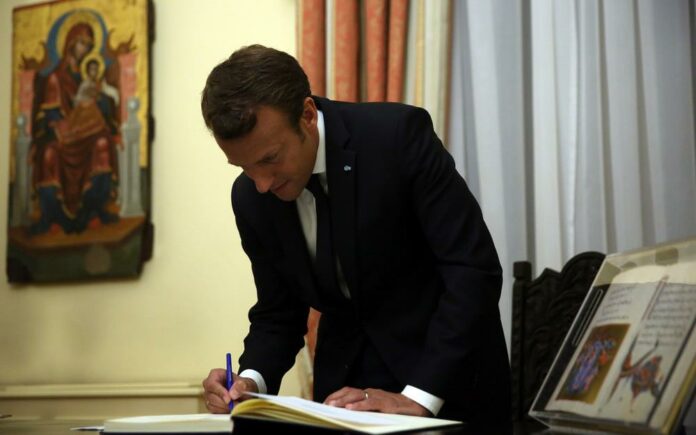Vassilis Kostoulas
[email protected]
French President Emmanuel Macron stayed “on message” again on Friday during the second day of his official visit to Athens, emphasizing that Greece needs debt relief but at the same time should unwaveringly continue with reforms – as demanded by creditors.
Turning to the more rigorous of those creditors, the IMF, Macron quickly added that as long as Athens stays on the path of reform then the Fund should not place new conditions on the bailout program.
In answer to a question by “N”, Macron repeated that all involved parties must remain committed to the current and third consecutive bailout program, so that it is the last.
Beyond the smiles, pomp and “photo-ops” of his visit to a sunny Athens, the French political maverick also appeared optimistic over the contentious labor market reforms he’s promoting in France, saying the first phase will be completed by the end of the month.
Macron faces his first real test in office with the labor reforms, given the shrill opposition by trade unions and the leftist opposition in the country.
He said he recognizes the risks and difficulty entailed in winning the French public’s acceptance of the liberalization, nevertheless he said he was determined to implement the reforms, while adding that his government will include measures to boost vocational training in tandem with the reforms.
During the French president’s meeting with a handful of Greek reporters at the École française d’Athènes, a day after an iconic address on Pnyx Hill in front of the Athens Acropolis on his vision for Europe’s future, he reiterated that he’ll again table the issue of Greek debt relief with Berlin. In picking his words carefully, he added that this issue will be broached strictly within the framework of the reform process in Greece.
Asked about the prospect of a “mutualization” of state debts within the Euro zone, he reminded of his support for the issuance so-called Eurobonds — i.e. joint borrowing by euro zone states – while nevertheless adding that such a financing instrument cannot be used for older debt, such the current load carried by Greece. Rather, he said, Eurobonds would be used for future financing.
Returning to Greek reforms, Macron echoed a bevy of major European leaders over the past eight years in saying they are, first and foremost, essential for Greek citizens, “not because the Eurogroup demands them … but so that Greece passes from subsidized growth to responsible growth.”
In burnishing his much-touted technocratic credentials and eschewing the more ideologically tinged connotations surrounding the concept of “solidarity” amongst Euro zone and EU partners, Macron admitted that solidarity “was absent from the Euro zone”.
In the same breath, however, he said point-black that “Greece erred” when it supplied fake statistics for its economy in the pre-crisis period.
Queried again over the “next day” for the Greek program, Macron referred to a need for a post-bailout scenario that is accompanied by “supplementary measures”, such a precautionary credit line, in case Greece requires assistance in order to fully and smoothly return to capital markets for its borrowing needs.
Finally, Macron said the Euro zone already retains a European assistance fund, the European Stability Mechanism (ESM), “which we haven’t exploited properly”, as he added.














